APEC Summit Ends With A Call To Set Up Free Trade Area In Pacific Region: China Wants To Ambush US-Led TPP

With a clarion call to step up "efforts to promote and realise the Free Trade Area of the Asia-Pacific," the two-day APEC Summit concluded in Beijing. The collective endorsement of the block to work towards the common goal of FTA was described by Chinese President Xi Jinping as a "historic" step. The 21-member bloc accounts for 50 percent of global gross domestic product and is home to half of world trade and 40 percent of world's population.
As the host, China made good use of APEC to articulate its vision and hard sell its clout within the bloc by talking about the roadmap for Free Trade Area of the Asia-Pacific. For China, the vision of reshaping the trade bloc includes hiking connectivity by establishing a network of railways, highways, ports and other infrastructure. Some lending bodies floated under China's initiatives will also stand useful for China in peddling such infrastructure build up, reported Channel News Asia.
Discomfort With TPP
China's strong case for a comprehensive FTAAP, was being seen as an attempt to shoot down other mini FTAs in the region such as the US-backed Trans-Pacific Partnership where China is sought to be excluded. Washington is at the vanguard of TPP and is projected as the umbrella for 11 other Pacific Rim countries such as Japan, Canada, Australia and Mexico for loosening their trade restrictions. A section of Chinese analysts did view TPP as an attempt to check mate Beijing's economic clout, though Washington is denying it.
At the APEC meeting, Obama did praise China for its attention on APEC's role in trying to clinch the FTAAP, first proposed in 2006, but reminded Beijing that the U.S. priority is still a compact TPP. But Obama put it diplomatically, "The regional initiatives will contribute to the eventual realisation and we see the engagement in the Trans-Pacific Partnership as a contribution towards that effort." Obama also justified U.S. leadership in a Pacific free trade set up, by calling his country an "out and out Pacific nation." But the U.S. strategy of keeping Beijing in good humour was also evident in the visa deal that sought to extend the length of business visas for each other to 10 years, from the current one-year and student visas from one to five years, reported The Wall Street Journal.
Rivals Talk
Beyond the APEC declaration, the most positive outcome of APEC summit was its contribution in de-escalating tensions between traditional rivals. Mr. Obama and Mr. Putin took time to talk some 20 minutes and discussed Iran, Syria and Ukraine.
The Chinese President on his part, held ice breaking talks with Japan's Prime Minister Shinzo Abe. It was to be the first high profile meeting between the Asian neighbours, in the last three years. Despite China's territorial and historical issues with Japan, Abe underlined the need for cooperation and peace with Beijing and efforts to diminish mutual hostility. "Japan and China, need each other. We are inseparably bound with each other," Abe told reporters.





















